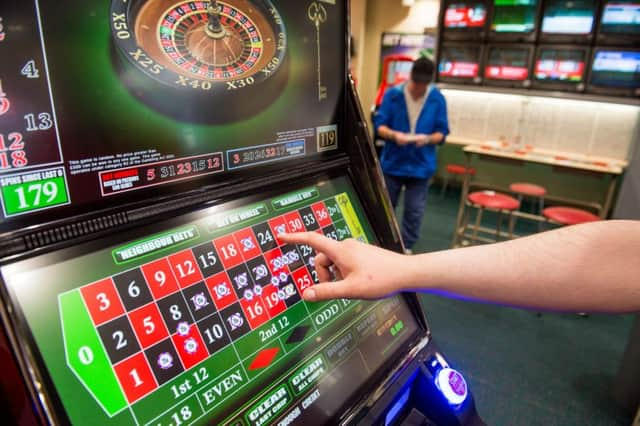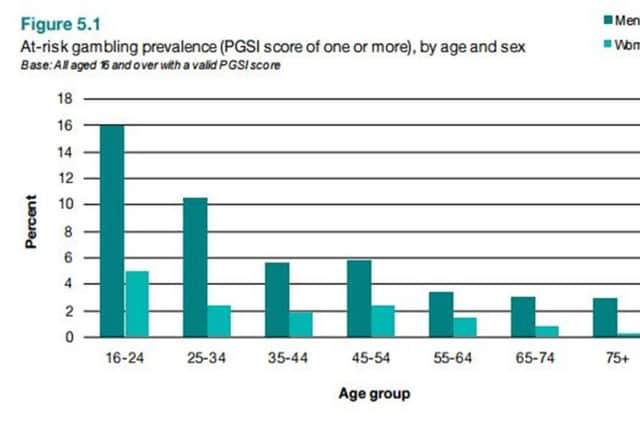Gambling in Scotland: Betting shops down but stakes remain high


There are 996 off-course shops north of the border, down from 1070 three years ago, according to figures from the Association of British Bookmakers (ABB).
The online gambling market is worth an estimated £1.7 billion a year in the UK, with a dozen major firms dominating the trade.
Advertisement
Hide AdAdvertisement
Hide AdAround 65 per cent of adults in Scotland and England have gambled in the past year, according to the UK Gambling Commission. When those that gambled only on the National Lottery are excluded this figure drops to 43 per cent.


Research suggests that remaining betting shops are ‘clustering’ on certain local high streets. Bookmakers suggest this is due to rival companies attempting to compete with established successful outlets.
On Dumbarton Road, in the Partick area of Glasgow, there are seven betting shops in less than a mile.
The Campaign for Fairer Gambling reported in 2014 that there is one bookmaker for around every 2458 adults in Glasgow - a total of 205 shops.
There are 95 licensed betting shops in Edinburgh.
A report compiled by Glasgow City Council found a correlation between gambling, the location of establishments and “lower than average economic activity”.
The Scottish Health Survey suggests only 0.7 per cent of the population - around 30,000 people - are problem gamblers - but this could account for one in 20 regular customers in bookmakers.
The gambling industry has responded by promoting a ‘self-exlclusion’ scheme where individuals can request they are not served in a particular shop. There were around 22,000 such self-exclusions across the UK in 2012/13.
A pilot scheme which allows those with gambling problems to exclude themselves from high street betting shops was recently to expanded across the wider Glasgow area.
Advertisement
Hide AdAdvertisement
Hide AdThe project allows people to call a confidential helpline to request to be refused service at any of 36 participating betting shops in Glasgow city centre, regardless of which company runs it.
Gambling regulation is a matter reserved to Westminster but the Scottish Government can use planning powers to assist local authorities who believe they have an over-provision of bookmakers.
“Independent bookmakers in particular have found economic conditions in recent years very tough and have faced a heavy regulatory burden in terms of requirements from the Gambling Commission and our commitments to responsible gambling and the requirements of local authorities,” said Malcolm George, CEO of the ABB, which represents market leaders such as William Hill, Ladbrokes, Coral and Paddy Power as well independent firms.
“We’ve seen a significant decline in the numbers of independent bookmakers, and it’s reasonable to presume that a significant portion of the shops that have closed (in Scotland) will have been independents.
“We still see a significant role for the high street bookmaker as a social hub and very much part of their local communities. But of course people’s tastes have changed with how they engage in the high street - whether that’s clothes shopping or bookmakers, but yes they facing changing competition.”
The rise of fixed-odds betting terminals (Fibots) in betting shops has prompted concerns that some punters are racking up eye-watering losses in short spaces of time.
There are around 800 FOBT machines in Glasgow alone, spread across more than 200 bookmakers in the city.
Punters are believed to stake around more than £500,000 into these machines each day.
Advertisement
Hide AdAdvertisement
Hide AdAs part of a cross-party Glasgow City Council report, a focus group found that the ability to gamble high stakes quickly was “a contributory factor influencing problem gambling for some users”.
Glaswegians using Fibots to play roulette and other casino games can place a new bet on average every 35 seconds during sessions that last a little over seven minutes – typically staking more than £12 on each spin.
Research showed that some five per cent of Fibot bets made in the city risk a stake of more than £50.
A Scottish Parliament committee recently took evidence on the issue as it considers two proposals on the regulation of Fibots. One under clause 45 of the Scotland Bill would allow Ministers to reduce the number of the machines in new premises, and one from the Scottish Government, which would extend that power to existing shops.
Committee convener Kevin Stewart MSP said: “Fixed odds betting terminals have become a familiar sight in betting shops across the country. But these are not without controversy. Tales of addiction and loss are not hard to find.
“The Scotland Bill proposes devolving power over these machines to the Scottish Government and our committee will be examining what this will mean in practice and what impact this is likely to have for communities where these machines are prevalent.”
Gamblers Anonymous Scotland, as an anonymous fellowship offering support to those with gambling issues, does not keep any records of numbers or types of gamblers.
“We can say that the range of forms of gambling is continuously expanding. This inevitably increases the numbers of those who become addicted to gambling,” its website states. If you are worried that you are someone you know may have a gambling problem, further information can be found at NHS Choices.